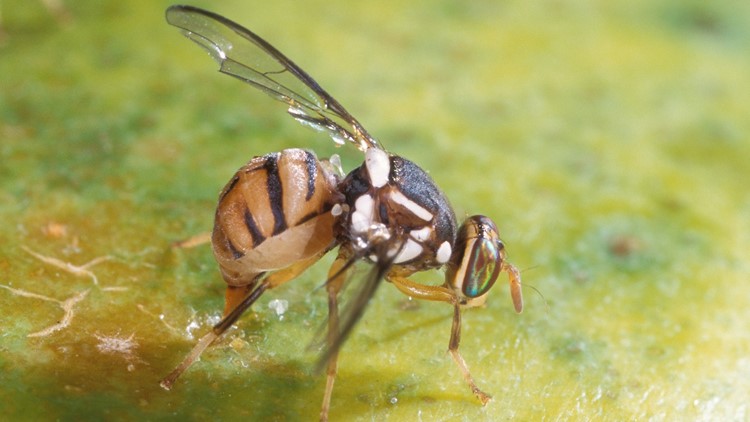A foreign fruit fly infestation has portions Sacramento and Yolo County under quarantine as the State and county authorities try to get the problem under control.
On August 30, the California Department of Food and Agriculture (CDFA) announced the quarantine due to the discovery of 15 Oriental fruit flies found in the area since July 30 to just this week. Flies were found within a few blocks of 47th Avenue and Stockton Boulevard intersection and north of the area by 14th Avenue and Stockton Boulevard.
According to Sacramento County Agricultural Commissioner Juli Jensen, this means there is a breeding infestation happening. This is an infestation that can impact growers large and small.
A pest that targets 230 different fruits and vegetables
The fruit fly quarantine impacts local growers, farmers, farmers markets, and more than 230 different fruit, vegetable, and plant commodities in the quarantine zone.
The quarantine zone is 123 square miles, generally bordered on the north by El Camino Avenue, the south by Laguna Boulevard, the west by the Sacramento River, and the east by Bradshaw Road.
Damage to produce occurs when the female fruit fly lays her eggs inside the fruit. The eggs then hatch into maggots, tunnel through the flesh, and make the produce unfit to consume.
With the quarantine in place, people are urged not to move their fruits and vegetables from their property.
Smaller producers have the bigger impact
For smaller producers in the quarantine zone, the impacts will be more noticeable. For those who rely on farmers markets for income, they won’t have access to the market for about 30 days.
“The certified producers that are inside of the quarantine area… they are going to be much more affected by this quarantine, because, if they want to go to a certified farmers market and sell their produce, they’re going to have to treat their produce,” Jensen said.
“They’re going to have to treat four times within a 30-day period, and they’re not going to be able to harvest and sell any of their produce during that 30 days that their treating.”
It’s a notable impact for producers with produce that is ready to take to the market, but will not be able to hold for 30 days.
While producers will not be able to sell their produce as whole fruit, they can sell them in a processed form, like a salsa or ketchup for tomatoes. Once the produce has been processed by pickling, juicing, freezing, or cooking, the produce is no longer an attraction for the fly.
The majority of larger farmers will not be losing their crops
“Luckily, the majority of them are not going to lose their crops or anything,” said Jensen. “They’re going to have some inconvenience getting the loads cleared to go the processors, but they will be able to continue their business.”
On Thursday night, a grower meeting was held in Walnut Grove with growers from Sacramento and Yolo Counties. Growers outside the quarantine area were also included in the meeting in case the quarantine zone was expanded and more flies were found.
The majority of growers at the meeting had grapes that were going for crush or tomatoes headed for processing. This meant that the majority of them are not going to lose their crop.
Producers will need to get involved with a treatment program
At the county level, authorities look for and report potential infestations. At the state level, the CDFA handles the quarantine and treatment. They also contact the certified producers and farmers markets that are impacted.
According to Jensen, the best thing for smaller producers to do is to get involved in a treatment program and get a treatment schedule for GF-120 Naturalyte.
Once this process has been done, a regular schedule is established, and a compliance agreement with the CDFA is signed, they’ll be able to go back to a regular schedule of selling at the markets.
For farmers, they’ll do the treatment themselves, but staff comes out to verify that it was done.
In order to eradicate the Oriental fruit fly, the CDFA relies on a "male attractant" technique. Scientists have been able to mimic the biological signals of the fruit fly that attracts males, and then the pest die after consuming the mixture. It's a method that's been successful for decades.
Dispose of fruit properly during quarantine
Sacramento county is asking people to not move host materials, fruits and vegetables off of their property.
“Don’t throw them in the green waste. If you have fruits that have fallen off your tree…, don’t throw it in the green waste," said Jensen. "Double bag it in plastic bags and throw it in the regular garbage. That way it’ll be buried in the landfill and that will help prevent the spread. It’s bad enough that we have the quarantine that we have now. We don’t want it to be getting any bigger.”
According to Jay Van Rein, a spokesperson for the CDFA, there's been good cooperation with disposal during quarantines in recent years. This disposal is important because farms could be impacted by the pest.
“That’s where the main attraction for fruit flies is, on places like farms where there’s a lot of produce that's available for both feeding and breeding for these bugs,” Van Rein said. He added that when a fruit or vegetable lands in the garage can, a fruit fly can lay its eggs and cause an infestation.
“The main point we’d like to make for point for residents that live in the quarantine zone is that they are safe and allowed to eat and process and use their homegrown fruits and vegetables on site, just please don’t move it off the property,” Van Rein said. “Don’t share it with neighbors or transport it across the [quarantine] zone or outside the zone.”
Travelers can bring produce from overseas with foreign pests
The most common way for a pest like the Oriental fruit fly to enter the area is by travelers bringing fruits and vegetables into the country illegally from other parts of the world or having produce shipped through the mail.
“The main risk and the main cause for infestations with these fruit flies is travelers, individuals coming back from overseas with produce that they brought back,” said Van Rein. “It’s not legal to bring that stuff back into the country that way, but it still happens.”
According to Van Rein, there are quarantines in LA every year due to the sheer amount of travel happening the airports.
The fruit fly quarantine might not last as long as other quarantines
“You don’t see as much of this up here, up north, but every once in a while, we get one…we do get these from time to time. Different flies, but similar situations,” said Van Rein.
“It has happened before for a number of different insects,” said Jensen. She added that the County is still dealing with the Japanese Beetle situation.
Due to eradication standards, a species cannot be considered eradicated until three life cycles have passed. And due to the Japanese Beetle producing only one generation per year, it takes three years of not finding any Japanese Beetles to consider the species eradicated.
The Oriental fruit fly has a much shorter lifespan. The expectation from the county is for this quarantine to last about eight months, provided no fruit flies are found.
Farmers markets will take precautions to prevent its spread
“For consumers who are going to farmers market inside the regulated area inside the quarantine zone… they’ll still be able to get to buy the fruits and vegetables they usually see at these markets, but they’re going to see them covered,” said Van Rein.
Whether that produce is in bins with a plastic cover or in a bin with a mesh or plastic sheet, the farmers markets will be taking precautions to prevent the flies from being able to feed and breed on the fruit.
Dan Best, coordinator for the Certified Farmers Markets of Sacramento County, says it’s something markets are prepared to mitigate. However, while the markets have dealt with quarantines before with the MedFly, the Oriental fruit fly impacts a large number of produce.
“We don’t worry. We just try to find the solutions to try to make it work… we hope it doesn’t discourage both growers and farmers from coming to the market,” said Best.
Six of the organization’s nine markets will be impacted the quarantine. While Best considers the likelihood of a fruit fly being carried out of the quarantine zone an “anomaly,” he says they’re putting together procedures to make sure the consumers and growers are protected.
Farmers markets should mostly be business as usual
When it comes to shopping at the market, some consumers will have to help the agricultural community and farmers in small ways by helping control this pest.
At the market, they will see some producer stands with covered in screens or have their produced covered with a plastic sheet while they shop, but there shouldn't be any concern in visiting the farmers market during the quarantine.
“There’ll be some inconvenience, but I think by and large it’ll still be the same farmers and it’ll still be the straight-from-the-farm vine-ripened, tree-ripened fruit… the reason you even come to the farmers market,” Best said. “Stay the course. Stay in the family.”



